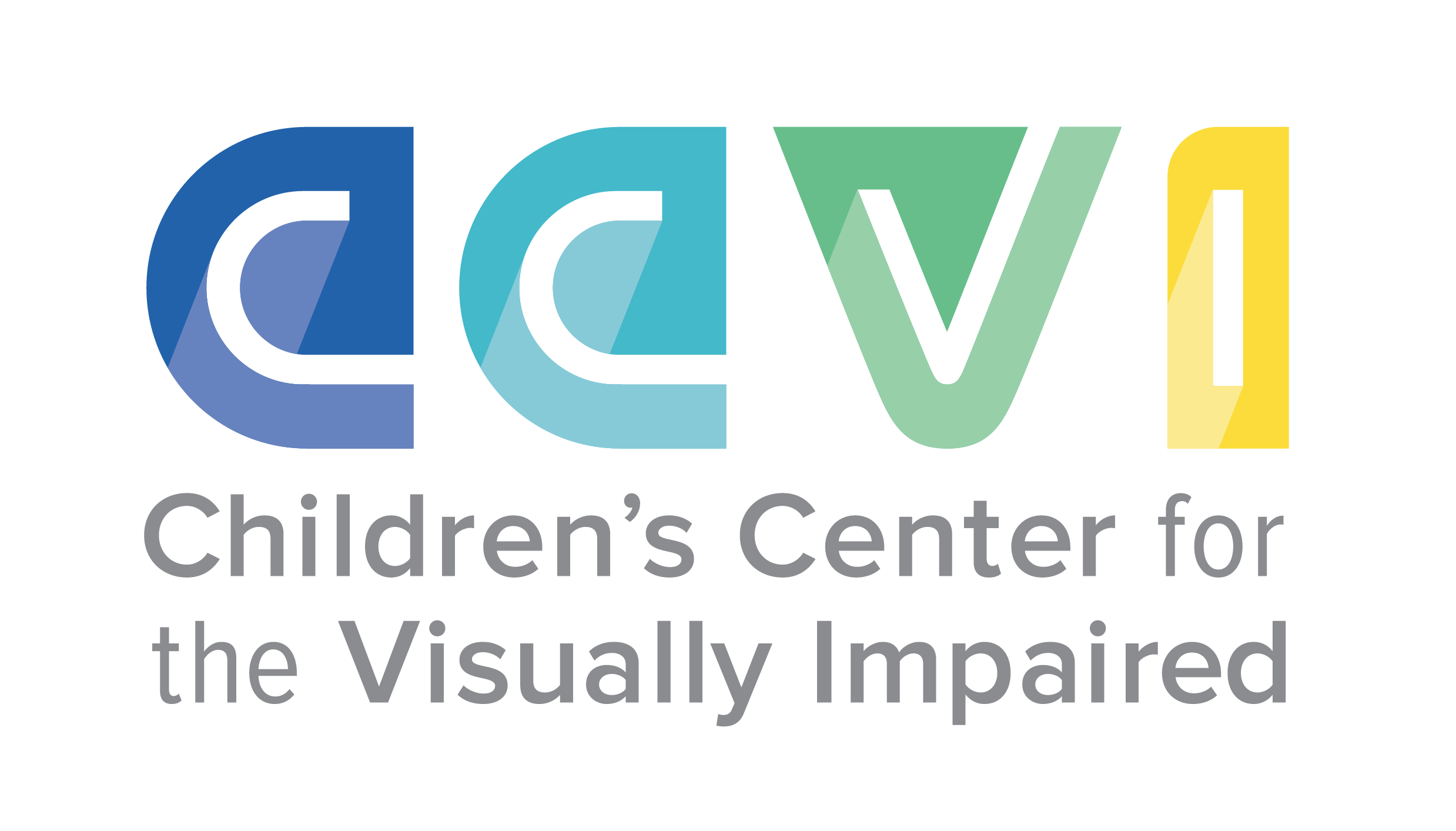
IMPORTANT NOTICE!
Children’s Center for the Visually Impaired seeks to support and empower children, meeting them where they are, so that they can reach their highest potential.
To do that, and in response to the past 10+ years of enrollment trends, we must make a change to our model of service. Effective at the start of the 2026-2027 school year, CCVI will no longer offer specialized preschool programming in the Early Learning Academy (ELA).
While our pre-k model is being phased out, our center is not going away. The only services impacted are the full and half day classrooms. We have expanded and will continue to expand our array of services, including comprehensive center-based offerings like evaluations, classes for infant & toddler families to learn side by side, medical outpatient therapy (physical therapy, occupational therapy, and speech-language pathology). More community-based offerings, detailed further below, are ongoing and will grow, as well.
Experiencing success
OVERVIEW
At Children’s Center for the Visually Impaired, students receive an inclusive, supportive, and personalized approach to preschool. This experiential learning becomes a viable method for growth and development. Textured, purposeful indictors on the walls are used to identify landmarks and the strategically differing ceiling heights allow for auditory cues to be used in the building.
However, the real specialty comes from the people who work inside. A staff consisting of Teachers of the Visually Impaired (TVIs), a full-time nurse, and a supportive administration team all work together to provide more than just preschool; they foster an institute of creativity and growth. Working closely with the therapy and specialized services program, students may receive services in physical and occupational therapy, speech and language pathology, as well as orientation and mobility, braille, and aquatic therapy, depending on the needs of the child.
Expanded Core Curriculum
assistive technology
Students at CCVI will be well-versed in the assistive technology that meets their needs. Examples of assistive technology include Augmentative and Alternative Communication devices (AACs), Braille writers, low vision aids, and more.
Career Education
To prepare for future careers, students are asked to participate in tasks throughout the classroom. These assignments can include choosing a job at circle time, helping a teaching assistant with a project, or recognizing and identifying the status of tasks that they must complete before the day is over.
Compensatory Skills
These skills are specific to individuals with visual impairments. In order to compensate for low vision, students are taught different techniques that will help them avoid common pitfalls that the sighted world holds. These skills can include Braille instruction, learning to use tactile graphics, or identifying landmarks.
Independent Living Skills
The goal of many CCVI students is to eventually live independently in adulthood. Therefore, the Preschool Program integrates lessons that directly relate to that mission. Some of these skills relate to meals, whether the task is feeding oneself or cleaning up the table. Other tasks relate to sanitary goals, such as restrooms and hand-washing.
Orientation and Mobility
Orientation and Mobility is provided as a specialized vision impairment service at CCVI. This art form of education is used to assist individuals in navigating their environment safely. Often at CCVI, children use a cane or other mobility device based on the recommendations of a professional. They also strive to learn directional and positional concepts.
Recreation and Leisure
CCVI would not appropriately educate children if it didn’t allow for childlike play and wonder. Recreation and Leisure are a core value and teachers use activities, such as choosing toys to play with or learning game rules, to provide the opportunity for growth.
Self-Determination
As an organization that serves children with multiple disabilities, CCVI understands the importance of advocacy. That is why self determination is a crucial principle our teachers instill in our students. This comes in the form of making choices about routines and activities. Students can provide feedback to their instructors about how they are feeling in a safe environment with mutual respect. This helps create confidence.
Sensory Efficiency
Many students come to CCVI will strong reactions to foreign textures or sensory clues. Therefore, CCVI instructors integrate activities to make their senses as efficient as possible. They try to maximize the use of residual vision, develop hearing, and encourage confident touch.
Social Interaction
Interacting with other preschoolers is essential to CCVI’s learning environment. This school serves to prepare a child for the rest of their life, which will include peers at all stages. Getting along is an important part of growing up. At CCVI, children learn to share with friends, orient to speakers, and engage in meaningful conversations.

Educators
Every lesson plan is composed and communicated by Teachers of the Visually Impaired (TVIs) who specialize in developing goals that address necessary skills to prepare a child for their educational future. These lesson plans include purposeful accommodations—whether that involves adapting materials to large print or braille, eliminating visual or auditory clutter, addressing augmentative communication needs, or incorporating special seating requirements.
classroom
Classes at Children’s Center for the Visually Impaired are designed to enhance essential skills and learn new behaviors that a child will carry into their next educational environment. 2-year-old children are able to attend CCVI 2 half days per week. Students older than 2 are able to attend for 4 half days or up to 5 full days depending on their needs. Individual Educational Programs determine the attendance for each student.
experiences
Children’s Center for the Visually Impaired values worldly experiences as a critical part of a child’s developmental education. Therefore, real-life learning opportunities hold a role in the core curriculum. At CCVI, field trips, community-based learning, and off-campus lessons give each student a wealth of knowledge about the world around them and help provide navigational techniques that they will carry throughout their lives.
Experiential Learning
CCVI Preschool Program students often take field trips into the community to experience the world around them and learn from it.
Some of the field trips in the past have included:
Apple Orchard
Pumpkin Patch
Horseback Riding
KinderConcert at Kauffman Center*
Kansas City Zoo
Bowling
Ice Skating
Deanna Rose Farm
KC Symphony Visit
Planting in the Sensory Garden
White Cane Safety Day
Streetcar Rides
*KinderConcert at Kauffman Center pictured here

“All the seeds the teachers and therapist have planted in Bella are now growing. We know she’s getting what she needs from every single person that’s at CCVI, you can’t go just anywhere and get that treatment. Bella has been such a blessing to our family, teaching us about resilience, teaching us how to be brave, take things with a smile. She’s just so strong. She’s just the light in our house. I’m so grateful to be here at CCVI with Bella.”
CVI Endorsed from Perkins School for the Blind
One of the most common diagnoses at CCVI is Cortical Visual Impairment (CVI).
CVI is a temporary or permanent visual impairment caused by the disturbance of the posterior visual pathways and/or the occipital lobes of the brain. The degree of vision impairment can range from mild to severe. The degree of neurological damage and visual impairment depends upon the time of onset, as well as the location and intensity of the insult. It is a condition that indicates that the visual systems of the brain do not consistently understand or interpret what the eyes see.
Many CCVI teachers and therapists are officially endorsed from Perkins School for the Blind in CVI. They are provided with training and other resources to understand the complexities and variants of the condition and how it impacts learning at a preschool age.

Meet the Student Services Director
Dr. Sarah Birk- Sarah was most recently a Principal for an early childhood Special Education center in the Liberty School District. She has a vast background in early childhood education, special education, and Conscious Discipline. Sarah has a deep knowledge and experience in training early childhood educators on the implementation of researched based developmentally appropriate approaches to learning and instruction across multiple areas of learning and social emotional development.
Sarah holds a Doctorate in Education from St. Louis University, a Master of Education in Curriculum, and Instruction from Central Methodist University and a Bachelor’s degree in Elementary and Early Childhood Education from the University of Central Missouri.







